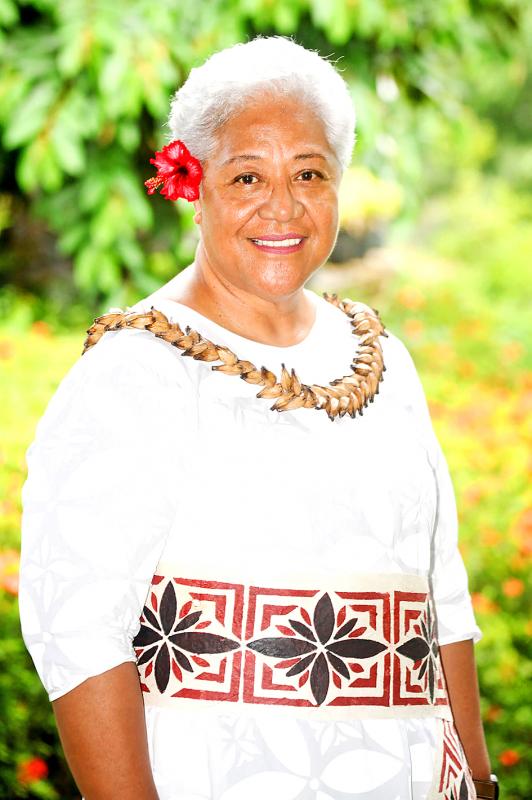More than three months after winning an election that sparked a constitutional crisis, Samoa’s first female prime minister was yesterday eventually able to take office.
A smiling Fiame Naomi Mata’afa sat in the chair her predecessor had been reluctant to relinquish after 22 years in power. She held her first Cabinet meeting, with members of her Faith in the One God of Samoa (FAST) party dressed in the distinctive red clothes that party members and supporters often wear.
Mata’afa, 64, said they were ready to begin their work.

Photo: AFP / The FAST Party Samoa
That could include a reset of the nation’s relationship with China. On the campaign trail, Mata’afa had pledged to stop a US$100 million port development backed by Beijing, calling the project excessive for a nation that is already heavily in debt to China.
After a knife-edge election result in April, Samoan Prime Minister Tuilaepa Sailele Malielegaoi refused to concede defeat, despite several court rulings that went against him.
He had two powerful allies in the nation’s head of state and the speaker, who were able to stall the transfer of power.
A bizarre scene played out in May when Mata’afa and her FAST party were locked out of the Samoan Legislative Assembly, with Malielegaoi saying he was still in charge. Mata’afa and her party members took oaths and appointed ministers in a ceremony held under a tent in front of the locked Legislative Assembly.
In an interview with The Associated Press, Mata’afa said that day was charged with emotion.
“It could have gone pear-shaped, but we were able to keep calm,” she said. “We could have stormed the building and knocked down the doors, like in Washington DC, but we just sat and sang a few hymns, sang a prayer.”
Last week, the nation’s top court ruled the unusual swearing-in ceremony that day had been constitutional, and Malielegaoi finally conceded. Mata’afa had previously served as his deputy.
She said in the interview that she resigned after becoming concerned that Malielegaoi and fellow lawmakers had gone “off the rails” by trying to politically intervene in the nation’s court system and judiciary.
“It was a classic case of power and corruption,” Mata’afa said. “We were slipping away from the rule of law, and I didn’t like that, but most of party were happy to go along with it.”
Mata’afa’s election win is seen as a milestone not only for Samoa, which is conservative and Christian, but also for the South Pacific, which has had few female leaders.
Mata’afa said she did not think her gender was a big issue in the election, and that her role in the traditional chiefly system was perhaps more important to voters, but she hoped that she might be a positive role model for Pacific women in other fields, showing what they could achieve.

Kehinde Sanni spends his days smoothing out dents and repainting scratched bumpers in a modest autobody shop in Lagos. He has never left Nigeria, yet he speaks glowingly of Burkina Faso military leader Ibrahim Traore. “Nigeria needs someone like Ibrahim Traore of Burkina Faso. He is doing well for his country,” Sanni said. His admiration is shaped by a steady stream of viral videos, memes and social media posts — many misleading or outright false — portraying Traore as a fearless reformer who defied Western powers and reclaimed his country’s dignity. The Burkinabe strongman swept into power following a coup in September 2022

‘FRAGMENTING’: British politics have for a long time been dominated by the Labor Party and the Tories, but polls suggest that Reform now poses a significant challenge Hard-right upstarts Reform UK snatched a parliamentary seat from British Prime Minister Keir Starmer’s Labor Party yesterday in local elections that dealt a blow to the UK’s two establishment parties. Reform, led by anti-immigrant firebrand Nigel Farage, won the by-election in Runcorn and Helsby in northwest England by just six votes, as it picked up gains in other localities, including one mayoralty. The group’s strong showing continues momentum it built up at last year’s general election and appears to confirm a trend that the UK is entering an era of multi-party politics. “For the movement, for the party it’s a very, very big

ENTERTAINMENT: Rio officials have a history of organizing massive concerts on Copacabana Beach, with Madonna’s show drawing about 1.6 million fans last year Lady Gaga on Saturday night gave a free concert in front of 2 million fans who poured onto Copacabana Beach in Rio de Janeiro for the biggest show of her career. “Tonight, we’re making history... Thank you for making history with me,” Lady Gaga told a screaming crowd. The Mother Monster, as she is known, started the show at about 10:10pm local time with her 2011 song Bloody Mary. Cries of joy rose from the tightly packed fans who sang and danced shoulder-to-shoulder on the vast stretch of sand. Concert organizers said 2.1 million people attended the show. Lady Gaga

SUPPORT: The Australian prime minister promised to back Kyiv against Russia’s invasion, saying: ‘That’s my government’s position. It was yesterday. It still is’ Left-leaning Australian Prime Minister Anthony Albanese yesterday basked in his landslide election win, promising a “disciplined, orderly” government to confront cost-of-living pain and tariff turmoil. People clapped as the 62-year-old and his fiancee, Jodie Haydon, who visited his old inner Sydney haunt, Cafe Italia, surrounded by a crowd of jostling photographers and journalists. Albanese’s Labor Party is on course to win at least 83 seats in the 150-member parliament, partial results showed. Opposition leader Peter Dutton’s conservative Liberal-National coalition had just 38 seats, and other parties 12. Another 17 seats were still in doubt. “We will be a disciplined, orderly